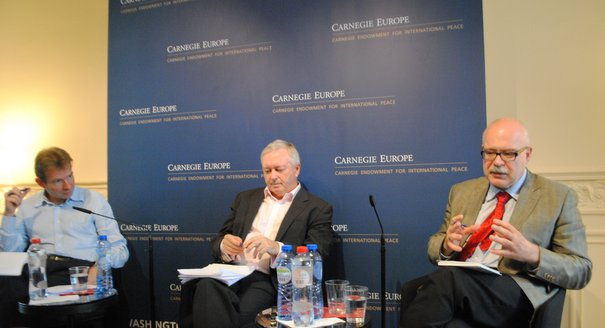Registration
Thank you!
You will receive an email confirming your registration.
IMGXYZ3805IMGZYXChina and Russia’s leadership of the recent Shanghai Cooperation Organization summit meeting, as well as their continued opposition to intervention in Syria, demonstrates an increasing rapprochement between the two emerging powers and their seeming mutually reinforcing global governance agenda. How durable is the Russia-China bond? How would they like to see their vision of a multi-polar world develop, and what does this mean for the West?
In cooperation with the EU-Asia Centre, Carnegie Europe hosted a discussion examining these issues with Charles Grant of the Centre for European Reform and Carnegie’s Dmitri Trenin. Fraser Cameron of the EU-Asia Centre moderated.
Event Highlights
- China and Russia: The Sino-Russian relationship has had a deepening impact on global governance, affecting major institutions as well as critical issues such as climate change and international trade, Cameron said. He described the two as an “Axis of Convenience.” Grant added that the bilateral relationship is crucial for the development of the international system. Trenin argued that the Chinese-Russian relationship depends to a large extent on each country’s relations with their principle economic and geopolitical partners or rivals, be that Europe or the United States.
- Global Governance to China, Russia: Russia and China have many similar approaches to global governance, Grant said, including:
- Both Moscow and Beijing see global governance as a Western concept, created by the West, for the benefit of the West.
- Both prefer concert diplomacy, such as international institutions that bring big powers around a table, without supralateralism and cession of sovereignty.
- Both powers strengthen their own neighborhood and global standing by homing in on regional institutions, such as Russia’s customs union with Belarus and Kazakhstan, and the Shanghai Cooperation Organization.
- Both countries have strong internal divisions between nationalists, realists, or sovereigntists, and liberalists, with the liberalists tending to have more influence on economic policy.
- Both countries share a strong abhorrence of Western liberal interventionism, such as in the cases of Libya and Syria.
- Both Moscow and Beijing see global governance as a Western concept, created by the West, for the benefit of the West.
- Approaches to Global Governance: Grant and Trenin traced the differences between Russian and Chinese approaches to global governance. Grant argued that Russia takes security governance seriously, while China does not. The current rise of economic power in China, compared to Russia’s receding economic power, could explain that gap in national approach to governance, Grant added.
- Global Governance in a Multi-polar World: In the long run, Grant concluded, the attitude of Russia and China towards global governance—towards multilateralism or balance-of-power politics—will depend on how successfully they rebalance their economies. The overall rise of power in China and Russia is a symptom of the changes occurring in the world at large. In order to establish a balanced international community for global governance, Trenin urged the United States to become more of a coalition builder and Europe to assert itself as more of a strategic player.
